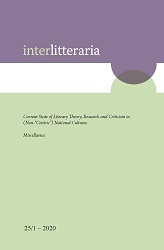I. V. Arnold’s Theory of Foregrounding and Its Application to Text Analysis
I. V. Arnold’s Theory of Foregrounding and Its Application to Text Analysis
Author(s): Vera MeniailoSubject(s): Philosophy of Language, Philology, Hermeneutics, Stylistics
Published by: Tartu Ülikooli Kirjastus
Keywords: foregrounding; decoding; stylistics of decoding; I. V. Arnold;
Summary/Abstract: The theory of foregrounding, developed by St. Petersburg scholar Irina Vladimirovna Arnold in the middle of the 20th century, was rather revolutionary for its time as it aimed to establish connection between formal levels of the language and textual meanings that allowed the reader to decode the author’s message. Arnold identifies four principal elements of foregrounding that disclose conceptual textual meaning: the strong position of a text, repetitions on different levels of language, the convergence of stylistic devices and defeated expectancy. The professor states that these elements of the text are always intentional and, thus, give a key to understanding the author’s message and position. This theory, being universal and easy to apply, has been widely used by Russian scholars working in the domain of textual linguistics and stylistics until nowadays. Such an approach increases the objectivity of the scientific findings in this area and enriches the overall text analysis with extra details and more meanings disclosed. The paper gives an overview of the theory of foregrounding, emphasizing the role it plays in text analysis and stylistics of decoding, and illustrates its principles with examples of practical analysis of the text conducted by the author of the paper.
Journal: Interlitteraria
- Issue Year: XXV/2020
- Issue No: 1
- Page Range: 16-25
- Page Count: 10
- Language: English

